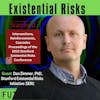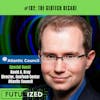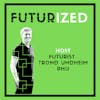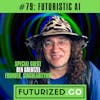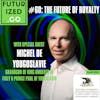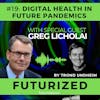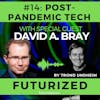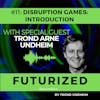The Future of Personal Development

Nick Jankel, transformational futurist, the CEO and co-founder of Switch On, and author of the new book Now Lead The Change, interviewed by futurist Trond Arne Undheim.
In this conversation, they talk about The Personal Development Market. VUCA (volatil...
Nick Jankel, transformational futurist, the CEO and co-founder of Switch On, and author of the new book Now Lead The Change, interviewed by futurist Trond Arne Undheim.
In this conversation, they talk about The Personal Development Market. VUCA (volatility, uncertainty, complexity, and ambiguity). Trends in Self-help, Leadership, Therapy, Coaching, and Healing. Brain science. Wisdom. Practical psychology. Bio-Transformation Theory. Reading cognitive v. emotional signals in yourself and others. The future of business and human personal development, next decade and beyond. Being future-proof (as organizations and individuals).
The takeaway is that the Personal Development Market is just starting up. If you include Therapy, Coaching, Leadership, and Mindfulness apps, it may well be a 100 billion market. The idea that we should be the change we want to see in the world, a saying that has been attributed to the famous Indian leader Mahatma Gandhi, is easy to pronounce but hard to do, but may well be an essential insight. What is for certain is that we cannot sit around waiting for positive change, no matter where we are on the societal ladder. Tying it explicitly to futurist thinking was novel to me and quite refreshing.
After listening to this episode, check out Switch On, Now Lead the change--the book, as well as Nick Jankel's online profile:
- Switch On https://switchonnow.com/
- Now Lead the change https://www.amazon.com/Now-Lead-Change-Future-Proof-Transformational-ebook/dp/B085TRK243
- Nick Jankel (@nickjankel) https://www.linkedin.com/in/nickjankel/
The show is hosted by Podbean and can be found at Futurized.co. Additional context about the show, the topics, and our guests, including show notes and a full list of podcast players that syndicate the show can be found at https://trondundheim.com/podcast/. Music: Electricity by Ian Post from the album Magnetism.
For more about the host, including media coverage, books and more, see Trond Arne Undheim's personal website (https://trondundheim.com/) as well as the Yegii Insights blog (https://yegii.wpcomstaging.com/). Undheim has published two books this year, Pandemic Aftermath and Disruption Games. To advertise or become a guest on the show, contact the podcast host here.
Thanks for listening. If you liked the show, subscribe at Futurized.co or in your preferred podcast player, and rate us with five stars. If you like this topic, you may enjoy other episodes of Futurized, such as episode 51 which is on AI for Learning, episode 16 on Perception AI, episode 49 Living the Future of Work, episode 24 on The Future of The Second Half of Life, episode 32 Future proof your business, episode 33 One Woman's Empowerment Quest to help one million, episode 73 The Future of Social Learning, and episode 34 Behavioral Science in Product Design. Futurized—preparing YOU to deal with disruption.
Personal Dev_mixdown
Trond Arne Undheim, Host: [00:00:00] Futurized goes beneath the trends to track the underlying forces. So disruption in tech, policy, business models, social dynamics and the environment. I'm your host. time, futurist and author. In episode 80 of the podcast. Topic is the future of personal development. Our guest is Nick Yankele, transformational, futurist, the CEO and co-founder of switch on and author of the new book.
[00:00:26] Now lead the chain. In this conversation, we talk about the personal development market VOCA, which means volatility, uncertainty, complexity, and ambiguity trends in self-help leadership therapy, coaching and healing, brain science, even wisdom, practical, psychology, and biotransformation theory. Now lead the change is a new book on mastering transformation and leadership.
[00:00:56] We talk about the future of business and human personal development in the next decade and beyond, and how to be future-proof as organizations and individuals. Nick, how are you today?
[00:01:09] Nick Jankel, futurist and author: [00:01:09] I am really good. Excited by the events of the last few weeks. What are you?
[00:01:15] Trond Arne Undheim, Host: [00:01:15] Yeah, it's been it's been hectic. All right.
[00:01:18]Nick, you are a transformational futurist. That's what you call yourself. I find that interesting. We'll explore a little bit with what that means. I I think I know what it means but it's also super ambitious, but I know you've been lecturing at a, a Yale and Oxford. You've been advising the UK prime minister.
[00:01:34] You've been covered in a bunch of publications, such as the economist, the guardian. And I'm assuming. Your path towards becoming a transformational future is this is interesting. So I wanted you to just chart that path for us. How does that happen?
[00:01:50] Nick Jankel, futurist and author: [00:01:50] Yeah, so I was always interested in the new and the coming as a kid science technology, we had a lot of Saifai.
[00:01:58]But I wasn't, I wouldn't say I was a futurist geek at that point. That came a bit later. So I went to medical school and to be a psychiatrist and wanted to heal the souls of the people. And about two thirds of the way through the medical degree, I decided I was more interested in ideas, history of ideas and the future of ideas than I was by Karachi per se.
[00:02:17] I jumped out, got a job in advertising, in consumer psychology and behavior and brand design. And that's where I first encountered the idea of trends transporting futurism as a career that people have made, but the kind of futurism that was going on there. Was more, what I cheekily call, next year is going to be all about beige which has nothing to do with what I do are super interested in these sorts of trend lines.
[00:02:42]What I became much more interested in is what are the driving forces on the fault lines of change? I started scenario planning with the guys that I'm GBN. I started to apply all that thinking into innovation and innovation theory and particularly into long range innovation. Five seven, 10, 20 year innovation cycle, horizon, three innovation to do horizon three innovation.
[00:03:06] You have to have a deep sense of what kind of future is moving towards us. And long story short developed thinking topics. And now I work at the intersection between say, futurism. Human development, people, development, leadership, development, innovation different strengths of those, depending on what I'm doing.
[00:03:26] So that's a very potted history I got here.
[00:03:31] Trond Arne Undheim, Host: [00:03:31] That's cool. So then to answer my question on transformational futurist, what exactly is it that's being transformed? Is it the world it's being transformed? Is it yourself personal transformation? Are you engaged in the transformation or is it the subject that you work for?
[00:03:45] I'm just curious about who is being transformed.
[00:03:49] Nick Jankel, futurist and author: [00:03:49] Just remind me of when in the Lord of the rings. When I think Bilbo goes good morning and Gandalf goes, is it a good morning? As you're telling me is a good morning. And so it just made me laugh. So I would say all of those things I I'm going to go back to marks the philosopher marks, where he says that, the point of not just to study the world, but to change it.
[00:04:09] And I guess for me, the point of futurism is not. To just see what's coming in the future, but to transform the future in the way that we envisage it to do that, we have to also transform ourselves so that we can envision clearly and deliver that's compelling. And these tour regenerative future, rather than a future, just good for me.
[00:04:32]And so there's a lot of transforming going on. So I guess I wanted to make sure that people think when they booked me, particularly for keynotes. Then not booking someone, who's going to give them a detailed understanding of CRISPR or blockchain. I can talk about all those things in passing, but I'm going to focus more on who do you have to be to make use of this future?
[00:04:51] Yeah. Yeah.
[00:04:52]Trond Arne Undheim, Host: [00:04:52] It was a bit of a leading question on my side because I do know that your new book is called now lead the change. So it's future-proof your career, your organization and your world. I think I was tuned into this, speak to me a little bit about this book, because it seems to speak to exactly that the, that your point here is to transform the individual and use all the external things that are changing around them.
[00:05:13] More as the material, I guess that's a, the conditions for that change or I guess maybe fodder for that change to tell me about this book.
[00:05:22] Nick Jankel, futurist and author: [00:05:22] I would say so because the three parts part, one, as you say is basically a look at how evolutionary theory demands that we change ourselves. And it does that through looking at the future, looking at three different dynamics that are going on basically says there's an imperative.
[00:05:39] The change, the transformation imperative, no one gets out of it. If you're Google or Uber, you have to do it. Whether you're an ancient company, that's been around for 200 years, it's for everyone to deal with. That's the first part, like a part, it goes, okay. Now how old, how do we step up? Yeah. Yes. The premise being that you have to change yourself, particularly your thoughts and beliefs and your behaviors.
[00:06:01] If you're going to change your company. As I say to my clients, there's no point in walking into a room of your senior exact saying, go and be inhibitive, go and create the future in a sort of aggressive, dysfunctional style, because that's just not going to create what you want. And then the third part of the book goes, okay, now that you understand the biology of change in yourself a little bit, as much as I understand it.
[00:06:21]What is the journey for you as a leader? Where do you go with that and how do you essentially change your company from the inside, out as in. Start with yourself, then go to your team, then go to the products and services you sell, then go a bit further than your company into the system as a whole. And how do you guide the system that you're part of to be a more responsible and ethical and sustainable?
[00:06:45]Trond Arne Undheim, Host: [00:06:45] So I want to talk to you about this personal development market that you are delivering services into because you are indeed a, a hybrid of a futurist and a personal development coach in some sense. Yeah. Yeah. Something like that, but before we get there, if you, then, I guess whether it's the first part of the book or the first part of the, of analyzing the problem, would you start you always ask your clients to start with themselves in terms of analyzing what's going on, or do you ask them to look at the volatility around them?
[00:07:14] Like what is actually step one in your transformation journey?
[00:07:18] Nick Jankel, futurist and author: [00:07:18] I almost invariably, I it depends. I always invariably start with the outside. We go outside in and then we go inside out. And then we might go outside and again and lots of various reasons, but I find that if we start any conversation, whether it's a a story, a keynote, which is a story, or whether it's a coaching or a leadership program, if we go straight to you, we've lost the kind of why when we've lost the fundamental reality that I always talk about, which is got to fit, you got to fit what's going on.
[00:07:46] It doesn't really matter whether you believe in adaptation transmit it doesn't really irrelevant. What your beliefs are. The world's changing fast, which it is you have to keep yourself in line with that change your own self career, your career. If you think you're going to, for example, I often say to people, if you think you're going to be a data data miner and expect to be better than an AI, you probably going to be out of luck because they, I will almost certainly be able to manipulate those data better than being in the net probably now, already, but the next five years, definitely.
[00:08:15]So I start outside in and then I very quickly go, okay, let's flip it totally into the micro moments of your being. You're feeling a certain thing and you're thinking certain ways, and then you're doing certain things because that's really where you can start any change happening. So yeah, outside in than inside out.
[00:08:34]And therefore we're always talking about seems like two different things, which is personal development. And let's call it organizational change. Innovation, social change, political change in the bookshop are two different books to different categories of books. Exactly. My work has always been about going if you're doing personal change and you're doing well, change and world change requires personal change.
[00:08:58] So there are actually one continuum and it doesn't fit neatly in the bookshop.
[00:09:03] Trond Arne Undheim, Host: [00:09:03] Talk to me about the current moment in human history, not just, the last week's developments, which, may or may not be relevant, when we post his podcast, but, ostensibly, where do you think we find ourselves?
[00:09:14] Or where do you tell your clients? We find ourselves at this moment in history.
[00:09:18] Nick Jankel, futurist and author: [00:09:18] It's a very exciting moment in history. I guess when you live through any exciting moment in history, everyone thinks their moment is more exciting than the last 30 years ago or a hundred years ago. But do you think there are some characteristics of our times which are particularly interesting?
[00:09:30]And I'll talk about three of them, which is the three lenses that I look at the world through. It's a rough, it's not meant to be accurate. It's meant to be useful, a map. And the three areas I looked through in this white called 3d futures framework, the first one is digital. And that means everything from AI and blockchain through to biotech, CRISPR, 3d printing of kidneys, whatever the whole capacity of digitalization.
[00:09:55] To change how we offer value and what kind of value we can offer is fundamentally found. And I also think we're at the beginning of that journey. So I was around in know, web websites, 1.0, dot com, boom original. I then seen the of 2.0, and I think we're still is going to be 5.0. And we don't know what that is yet.
[00:10:18] One of the things I often say to people, which I find, and this is fascinating, given that I'm a physician to very smart people is no one human being can understand the social and human impact of any one of these. It's a toll fourth industrial revolution technologies let alone how they all are going to interact together in a complex web of bits and Brex and biology.
[00:10:40]Trond Arne Undheim, Host: [00:10:40] Do you, when you talk to experts about this, do you feel that the experts agree with you that they increasingly are losing sight of the things that are outside of their particular field of expertise? Or do you sense that there are people out there who are still trying to grasp at the totality of what's going
[00:10:58] Nick Jankel, futurist and author: [00:10:58] on?
[00:10:59] I think it's the futurist job to grasp and then to be humble with the impossibility of that grasp. And to do both, but I do think I just happened to watch a documentary actually last night on CRISPR and asinine proteins and all the things that are going on there. It was very clear that the world's experts, the potential Nobel prize winners in this, in these areas are very focused on their bit of this hugeness.
[00:11:23]Whether it's sickle cell anemia or creating sheep, pigs from without various different. Functions. They're all very specific. And that's the nature of the modern reality. When I say modern, sort of 17th century to now, which is you gain your expertise through going deeper and deeper into one tiny thing, and then maybe some people come back out of that and become generalists again.
[00:11:46]I think therefore I think the technical technicians know one thing really well. And the job of the generalist and futurist have to be generalists, do this job. I want to say features, I'm going to send you business card. Your job is strategy. If your job is CEO of this company, you have to be a futurist of some is opposite.
[00:12:03] Join up the dots and be super humble that there's never been anyone who's ever predicted accurately complex webs of that new technologies are interested in the market. And what's interesting about now is not just like the book, the printed book. Which in itself was only one part of a web of technologies that we needed.
[00:12:22] For example, the Salesforce had to sell books, have to change fundamentally the process of old books. We're having like a hundred of those happening at the same time. A hundred printing presses are being generated and it's phenomenal and dizzying and amazing. And worrying. Obviously we have lots of worries about this.
[00:12:39]So that's one that's one major lens to look through. I think is interesting about it is unprecedented opportunities do things in a fundamentally different way, not just a little bit different. And the market leader secondee is more interesting in some ways, but less showy, less jazz hands, which is disrupted society has disrupted generations, different types of needs and wants.
[00:12:59] And it's very easy to forget any market, whether you're a CEO or a church leader. Social enterprise, you exist, serve the needs of your clients, customers, your users. And if those needs are changing quickly, they are between generations and even within generations, then you have to really think about how to serve real needs, because always you will have a business because if an empowered 25 year old can solve the problem you designed your company to solve.
[00:13:28] 73 83 93, 2003, even 2013. And you weren't being in existence when they are your major customers. So that's really interesting. And that requires more of a sort of anthropological or sociological brain to understand these things afraid of them. And then the third D the lenses. In fact, I think most of us are now waking up to the reality that our ecological systems by natural systems are.
[00:13:54] Biological systems are stressed to the point of breakage. And I call that the damaged world. And that's really intense and I don't think any one human being can solve any really one of those damaged world problems, but we should all be aware of all of them, whether it's pollution which kills about apparently a million people in China alone a year.
[00:14:10]Whether it's climate change, whether it's coral, Reece, dying, et cetera. And then what you get with those three DS is appreciating where you've got technologies. Plus new needs equals potentially alleviate some of the great crises as well of making a good return. That's for me the benchmark, I'm holding myself to a benchmark.
[00:14:34] I'm holding my clients to my audiences, to, which is use digital. Don't just scale without thinking about externalities scale, thinking about purpose, as well as profit, and really find the customer of the future that you want to serve and serve that problems, your made up problems for them because they got plenty of authentic problem.
[00:14:59] Trond Arne Undheim, Host: [00:14:59] Yeah. I was curious about that because leading the change you say, but what's the point of that change? Because part, partly of course, if you're talking about just a. Disruptive change happening around people, then it's just about dealing with it or capitalizing on it, but you're why do they need to lead this change?
[00:15:17]Is that kind of both to achieve personal balance and to capitalize it's a joint you're arguing that analyzing. The emerging future has two separate benefits, one achieving kind of unity with yourself and healing and a basically kind of balance of some sort and to, it has to do with capitalizing on opportunity, which you couldn't do if you didn't really understand what was happening around you to this
[00:15:42] detailed
[00:15:43] Nick Jankel, futurist and author: [00:15:43] degree.
[00:15:44] So I talk about in the book, a triple win win, and that's the kind of question you ask yourself. What's the win for me? In terms of my balance purpose sense of meaning, sense of belonging and enjoyment of my work financial award, for sure. Seeing my kids, reasonable amount of time, et cetera, et cetera.
[00:16:00] So what's the wind for me. What's the wind for my company organization. How do I align those two? And then I do believe the transformational leader is always thinking of what's the win for the world. How do I alleviate, for example, unemployment in my area or apprenticeship, lack of apprenticeship or waste food within our model.
[00:16:20]And the more we bring those things to the center of a model foster, we're going to get to a point where we go, you know what? We've cracked climate change. We've cracked that we actually gonna to have a world. And one of the things we often say in our work is there is no economy without an ecology.
[00:16:34] It doesn't matter how successful your business is. If there aren't people and resources to buy and produce your things, there is no business. Yeah.
[00:16:44] Trond Arne Undheim, Host: [00:16:44] Are you optimistic or pessimistic? Around
[00:16:47] Nick Jankel, futurist and author: [00:16:47] this present moment? Both in equal, probably I'm profoundly ambivalent in a good way. Which I call him my book the third way, where you're bringing two seeming opposites together.
[00:16:57] I think is key to leadership is helping people realize that left and right up and down, bottom up top down, they're all. If you can bring them together, you usually get the outcome, the better outcome. So I am deeply pessimistic and I use that pessimism to alarm people. I want to alarm people that there is some fundamental stuff that can't be looked at, pushed anymore away.
[00:17:19]But if I was just a pessimist, I shouldn't be on stage anywhere. Because it's not a good place, not a functioning place to leave people in because the brain network we're in, when we're threatened, isn't very good at creating new responses. And therefore I always bring people into optimism. I also am profoundly optimistic.
[00:17:34] We are amazing human beings. The thing I think we have to always remember is we're not saving the planet. We're saving ourselves. The planet will be fine. We'll continue past us, has done in the past until the sun explodes. The question of whether we, as a species are here, whether we can handle 7 billion, 8 billion, 9 billion people, those are bigger questions that are up for grabs.
[00:17:54]And we've seen what happens when people feel their wages are being stagnated and their work is meaningless. We've seen what it creates in society over the last five, 10 years. And it's not nice for a lot of people and it doesn't make for good business. It doesn't make for stable economies. And so we'll interrupt related, right?
[00:18:12] So I'm deeply pessimistic, deeply optimistic. I'm not sure about an article on medium. If anyone wants to search for it saying, do not be positive in a pandemic because it was a rash of positivity. It's all going to be okay. It's like that doesn't help it. Doesn't help to be positive. Fakely positive, but not as it helped to be doom and gloom, catastrophizing overdramatizing and a leader has to look at things as they are.
[00:18:36] This is the reality and find a way to go. And there is something we can still do. And that action point something we can do today, not just conceptually is where I think hope comes from, where you can draw. Hopefully.
[00:18:50] Trond Arne Undheim, Host: [00:18:50] I like that this balance, because I have also seen both, you see these arguments that, the pandemic doesn't do anything.
[00:18:58]You can ignore it and then you have those people saying it's going to lead to all these massive positive changes without. Regard for the fact that there's obviously been ad is a tremendous destruction. And then of course the dystopian view, which is, the entire world is simply falling apart and there's nothing we can do about it, which sort of leaves us with lack of agency.
[00:19:19] Talk to me a little bit more about personal development, because, I guess I'm used to thinking of that market as, like you said, a coaching type market, very separate from any kind of awareness of change beyond the individual sort of psychological needs for change. How do you see this market evolving?
[00:19:38] Is it actually now. Are you among the few that combines this idea of futurism and awareness of the external realities with personal development or is there now a move within this personal development field to increasingly take in trends from the outside and the socioeconomic picture as part of healing as you might make, might call it.
[00:20:00]Nick Jankel, futurist and author: [00:20:00] I think when I first had my sort of epiphany about these two things being one thing, I was definitely one of the lowly voices. I remember sending my book that connected personal development with social change, to the guy who published at cot Toll's book the power of now SLO and they sent back to me very interesting, but we don't publish politics or society books, Bradley books.
[00:20:23] I was like, Oh that was 15 years ago. I think the world has moved on. I think people are definitely bringing the personal and the political yeah. Coming together. There are books about that. If you look at extinction rebellion, for example, there's quite a lot of focus on personal wellbeing, resilience.
[00:20:37]Black lives matter, the same as a mindfulness programs in both the Senate and the U S the houses of parliament in the UK. So there is a growing insight that if we are not functioning well ourselves, then we aren't gonna be making great decisions for our companies slash society. That said there's a tendency in the personal development space to become very narcissistic and had the nest.
[00:20:59] It will that me, if I was actually writing an article that I wrote five years ago, but I'm going to publish on medium soon. It looks at research into. The original shamans. So not the ones that you see now on billboards in cities everywhere, but the actual sharmans in villages, in towns and employed billows in rural or whatever.
[00:21:18] And the history of shamanism makes it quite clear that the IX ecstatic altered States that sharmans help them get into it. It's not for their own personal healing and benefit so that they can understand what to do with the tribe, how the tribe is going to fit with what nature moving, et cetera, et cetera.
[00:21:36] And so it's still a tendency within the personal element space to be all about my best self or afraid. I'm living my best life. And that for me is the totally the wrong message. Yes. I need to heal my own trauma. Yes. I just sought my relationships out. I need to make sure I've got an income. I'm not living on the street and that's just the entry point for them being of a useful role in society.
[00:22:01]Whatever you look, however you see that. So the market's changing actually did some little bit of research prior to this, just to check out the, some of the numbers in this. And I was amazed to see wellbeing as a whole is a four and a half trillion dollar business. And it's three times the size of the pharmaceutical.
[00:22:18] So now within well-being, there's lots of different weight loss to coaching. But it's interesting that people are definitely realizing that they have to invest in themselves. Alternative ways to the medical system. And it is a growing market. Yoga's obviously huge, but again, yogurt developed as a, almost an ethical tool for living in accordance with Brahman,
[00:22:45] Herschel thing, but it's now become a kind of way to get tight, a tight, but. It's a tight butts solution. So you can see how we easily take these technologies, personal development and turn them all into how do I live my best life. And so for me, there was a lot of change, but there is growing recognition that we can't just keep on our own yoga mat.
[00:23:10] We have to push out into the world. I think that's a generational thing as well, generation of younger people going, it's not just about meditation. It's about social action.
[00:23:19] Trond Arne Undheim, Host: [00:23:19] I see a parallel actually to another topic that we talked about a lot on this podcast, which is startups, because, many of the startups I've worked with at MIT, especially, the founders, didn't start with the departure point of.
[00:23:32] What's in it for me, they started with, what is a problem in my community around, around me and how can I fix it in this case typically using technology. But it was interesting to me that, in working with a couple of thousand founders, they, many of them were able to create very successful companies because the mindset wasn't just me, the mindset, wasn't just my tech, it was.
[00:23:54] First finding something around you that you were upset about that you saw was negative for a group of people around you and then trying to fix it. And I think ostensibly, a lot of the good parts of this startup craze where everyone, now wants to start their own company. Up until that point.
[00:24:11] It's actually really good. Self-development because it is focused on the community in the same way that, I guess you're focusing on the community, if you start an NGO, but I have also seen the excesses and I want to do comments on that when starting a company becomes a lifestyle. So you have these like espresso drinking startup folks, who sit in, whether it's London or New York or wherever it is.
[00:24:33] And they. We'd love to go to all these networking meetings and eat free pizza and have espresso and sip and talk about their startup projects. And that's not necessarily, that's the equivalent of getting a we're working on your butt in a, in yoga, I
[00:24:47] Nick Jankel, futurist and author: [00:24:47] guess I would say not just it's the same, it's the same human raving to use something that is agnostic.
[00:24:54] So startup is like Gnostic, but agnostic technology is agnostic. We always forget this right. I watched him one of my books that disruptive technology was the gas that used in the Holocaust. It wasn't disrupted it scaled something that had to be done usually by, but suddenly you could do, a few hundred people, so Hologic, agnostic, startups, or agnostic.
[00:25:14] And again, you can use the wrong part of you. If you like to use startup culture as a way of make feeling good about yourself. No, the global nomad I'm in Bali this week. I'm in burning man next week. Do I have an actual company don't really know, don't really care. Someone else is paying, whether it's an investor or parent versus people who are deeply passionate about solving something.
[00:25:35] I saw this in the late nineties, people are more worried about what their type of furniture they were buying for their office. And they were whether they actually had a customer proposition that someone actually wanted. And that's my first business was actually helping. Funded startups find an actual business proposition using consumer insight, consumer knowledge.
[00:25:53]So that was, I've seen all that thing, but I would agree with you most startup people that I know who have successful ones, I ended up working with myself genuinely care about something. Now, one of the things I try and challenge people. And is it worry, is it a sort of middle-class problem?
[00:26:05]Is it a entitled problem that you're trying to solve? Can I park in San Francisco? No. Okay. Let's create a whole app all about, millions of. Dollars of people's time and energy and money focused on something that really, it's not what I call a problem worth solving. What can we use purpose, which comes from that puzzle development piece as a lens to go, I can feel where I'm comfortable and where I think I might get money, but I want to push myself into where there's actual problem that if we solved it, it would then cause fundamentally our triple win in the world.
[00:26:36]And then be careful for the Facebook effect where you start with that kind of mentality. And you get sucked back by the logic of markets, the chase, the easy money, the middle class, the upper middle class money titled money.
[00:26:47]Trond Arne Undheim, Host: [00:26:47] That's interesting. I think I'm actually cautiously optimistic that the COVID moment is pushing at least some people who would have otherwise, ended up with these more Fluffy startup projects to try to apply themselves towards something is slightly more meaningful.
[00:27:02]It doesn't necessarily have to be in the medical field. I'm actually pretty upbeat on industrial industry 4.0 type technologies for the specific reason that it addresses one of the things. That I think we have neglected for 30 years. We have made a lot of kind of knowledge worker technology for the white collar workers sitting, to improve our work at the desk.
[00:27:21] But meanwhile the great swath of the world's population, they still earn their living. Actually as a frontline worker doing something. Very exposed, whether it is to virus or simply just exposed to other people or exposed to working closely together or indeed working with machines. And all of that, hopefully is now getting both safer, more efficient and perhaps slightly more meaningful as technology
[00:27:46] Nick Jankel, futurist and author: [00:27:46] is helping because the technology can take away the banality and the mundanity of a lot of these things and allow people to feel like they're bringing some brain and some heart into their work.
[00:27:57] Because the technology is taking care of some of the, of those basic movements items, things like, yeah, me too, factories and frontline workers meat, packing, these sort of places where it's been pretty grim the last few months, I, from what I can understand, and I've got friends and family who are such frontline workers, and while I've been spending a lot of time on zoom, They've been frantically working their asses off to make the world work and to keep themselves safe.
[00:28:25] And th the amount of stress they've been going through just with their own safety. In fact, my mother-in-law in Sacramento was asked to work. She's over 70 asked to work on the front lines in the middle of the first lockdown as the Rita for people coming in and out of the building corporation.
[00:28:41] And Yeah, that was a real source of concern and worry for her. Yes, I think if we can use the pandemic as a catapult point for purpose for solving people's different problems. One thing I often say is the great news is we give to our young people. The great news is there are problems we're solving everywhere.
[00:29:01] You take off your goggles. You're enlightened titled goggles, and just go and walk around your one community. You will see loneliness, depression, homelessness. Meaninglessness, ill health, et cetera, et cetera. There's literally no shortage of problems. We're spending a lifetime to solve.
[00:29:16]Trond Arne Undheim, Host: [00:29:16] I have a question.
[00:29:17] So you said you wanted to become a psychiatrist. Let's say go back to that for a second. I don't know if this is actually your intended goal, but in some way you are scaling psychiatry with this approach, right? Because at least pre pandemic you were, you were giving leadership lessons and coaching and and speeches, to a mass audience.
[00:29:35] Yes, or at least a larger audience than you would have if you were in the traditional mode of giving pills to individual people, or even just coaching individuals. Tell me a little bit about scaling, scaling, wellness that way, because traditionally it is a coach type one-to-one relationship and there obviously a lot of safeguards involved with that.
[00:29:59] And it's good to, to meet another human being when you are vulnerable. How can these kinds of approaches scale?
[00:30:06]Nick Jankel, futurist and author: [00:30:06] That's my fleet. Yeah. That's my, problem that I ask myself every day. How can I scale this technology? I've been asking it for a long time. So the, one of the things that we've developed in the company is a peer to peer coaching.
[00:30:20] So it basically says what's the greatest. Market failure of therapy, coaching psychiatry, it's having a professional because it limits the number of people. And whenever we think about my thinking, whenever anyone thinks about scaling the unscalable 7 billion people there, aren't gonna be enough trained therapists to deal with everyone's worries, pain, suffering trauma.
[00:30:41] So I think part of the solution is peer to peer. So we've got two toolkits, one for leaders, one for individuals. Which you connect with a colleague or a buddy or a friend or lover partner, you maybe have a child. And it holds you fairly safely through six to 12 sessions of coaching. There are things we've done to minimize the risk of what a therapist might call an AB reaction where you're triggering painful moment.
[00:31:06]So we reduced efficacy in order to increase safety. Which is standard practice in the medical world, right? Is you have a jury with a brain surgeon. But we can't afford that or you don't have one, so we're going to do something else. It's not quite the thing, but it's going to be closer to the thing.
[00:31:20] So that's one approach is peer to peer. And we're about to actually relaunch our peer to peer toolkit with quite a big push back into the world. Because the moment is obviously of this moment very much I am then having also looking very hard, hardly at what happens after meditation apps.
[00:31:36] Where did, where does amplification take transformation? And particularly given that we've already codified a lot of our tools for large audiences. So I've done audiences, I've done workshops for 5,000 people in 30 different countries using printed tools that we've codified. So they could actually do something, not just listen to us, but all those tools, how do we use.
[00:31:56] Machine learning particularly to provide the right thing at the right moment for someone and potentially create new tools by disassembling those we've gotten reassembling them in interesting ways that I couldn't possibly tell gene. And then the third level I do think VR is what I think we will end up going from peer-to-peer to app, to VR, where you could essentially have.
[00:32:24]A kind of guru coach with you who understands you and understands whether you like music or visuals, or was what things bring you to tears? What things inspire you to action and can start to learn how to relate to you in a way that even the best therapists, if you're talking about old fashioned five days a week, analysts can't do you know, in the six sessions of counseling you get on the national health system in England.
[00:32:48] There not a lot of customization.
[00:32:51] Trond Arne Undheim, Host: [00:32:51] Yeah, I agree. There's a striking lack of personalization in medicine compared to where we are technologically, but I think also having reflected on this pandemic moment, there was an awful lot of technology that wasn't ready for prime time either. We, I think we thought we had a future work technologies sorted out.
[00:33:09] We didn't. We thought we had like technology, very advanced. It was like five years too early. Even for the newer types of XD instead of no, we're going to come out the marinade type vaccines. So we really didn't have everything sorted out. This was a question I actually didn't know that I was going to ask you, but is there a way to save the Facebook FSH?
[00:33:29]I don't know if that actually is a word, but the social immediation of the world. Let's just make it neutral. Arguably it's been a lost decade for ma mass communication with some meaning, and we arguably these companies have almost destroyed the public space. Is there a way to rescue them as individual companies for good, or do we have to wait for the next technological and entrepreneurial wave to create something very different, a different animal that can actually.
[00:34:01] Do what these companies claim they were doing. Google is not, don't do evil and Facebook. I don't know exactly what they claimed early on, but it was something to do with connecting friends across borders and doing wonderful things. And neither of the companies really did what they said they were doing.
[00:34:16] And I think that's a universally acknowledged. Issue not to say that they are doing evil, but they clearly haven't, they haven't brought the world to a new consciousness level in the way that you were would work with that word. What is the next stage of technology? In that regard,
[00:34:32]Nick Jankel, futurist and author: [00:34:32] This is the edge of my, where I'm at as a thinker futurist.
[00:34:34] So I've just created the beginnings of a keynote. Cool regenerative technology. So how do we take the concept of regenerative agriculture, which is now big going big? Walmart has just declared, it will be a regenerative business. How do we take this idea of not just minimizing damage, but actually mulching human society, making it better rating the soil of our society through social media.
[00:35:00]And I'm working on a set of principles. If you like design principles for generative tech share mixer of soft staff consciousness stuff, how do I feel, think, and act my purpose, our purpose, and then also some harder stuff around business model design where are the leverage points where you can, for example, reduce extraction.
[00:35:19] One of the big problems with the social media spaces, you're following the logic of huge venture capital investments and then P investments. We're looking at a hundred X, a thousand X, that logic alone will start to feed you into a machine system where no matter how much joy and purpose and meaning you had, it will start to be relentlessly corroded until you get what you have today.
[00:35:43] Unless you have really strong internal leadership potentially have different choices around money. And so one of the things, so I w I obviously have a lot of friends and connections who are in tech for good space. And one thing you realize over and over again is one of the systemic failures is till we have different forms of investors transformational investment with different asset classes for regenerative capital.
[00:36:07] If it ways of measuring ROI, SROI ROI, whatever the logic of capital will continue to eat away against purpose. So I'm both an guy, again, as you can probably tell, I think we have to try an idea. We've not worked with large corporates is because I believe they are, as Joe Biden has said, the S the soul of a corporate is still up for grabs.
[00:36:27] Anytime you got young people coming in with meaning and social justice thoughts got young older people who want to bring better talent in, they use them. So you can still fight for the soul of a business at any time and still see if you can course correct it.
[00:36:40] Trond Arne Undheim, Host: [00:36:40] You can Dick, but I do question this idea that people have.
[00:36:44] So you, so people seem to go from this one assertion that companies now are becoming equally powerful as nations. I've even heard it in European. Leaders started saying this as a justification for regulating big tech, but then they're saying one, one path is regulating.
[00:36:59] The other thing is just self imposing that corporations should become more like governments, but isn't that just juxtaposing a governance framework that doesn't fit because these big tech companies and other companies, even though they are powerful, they were never. Governance wise, they were never set up to actually listen to their employees in a systematic manner.
[00:37:21] They were never set up to address diversity, really in fairness. So all of these things are like they're patchwork fixes on an organizational model. That's geared towards something completely different, namely profit. I couldn't agree more. How can this be
[00:37:36] Nick Jankel, futurist and author: [00:37:36] done? So I think so.
[00:37:38] Definitely you can course correct. But I also think the new breed of entrepreneurs who are genuinely purpose driven will also disrupt some of these people out of the market. I think I'd be amazed if there isn't a Facebook like app, which many people have tried, obviously not reached critical mass Bobby's.
[00:37:56] And if we don't someone doesn't invent one in the next 10 years that shifts the dynamic back to people with their data and with their own ownership of that activity. That's so that I think there's a both. And so you've got, we've got rugged regulation, which I also have to say, I'm a, generally a progressive in things I don't believe regulation is a brilliant tool for changing businesses.
[00:38:16] I think it's a toll you have to have when people don't do the right thing. And I think about Thomas Paine who wrote common sense part of the American revolutionary spirit, and you've got to actually in the town near me, Talks about the idea of governance as a whole, as a badge of lost innocence, because if our consciousness were clear, we wouldn't need government to regulate.
[00:38:33] So I personally work on that bit of it. I think government has to regulate because people just aren't moving quick enough, but I do think market forces of talent, finding the best people will probably be the best at the bigger change and actually worked for a drinks company around 20 years ago.
[00:38:50] And they were saying, listen, Irrespective of where the government regulates, which they still haven't really, the drinks industry is more of a self regulated system. No great graduate from MIT, Harvard, whatever will want to work in a company that creates causes liver cancer without being mindful of it and conscious of it and looking at how to resolve, it's a difficult one, if you sell wine, then you sell cancer.
[00:39:11]But then same way as if you sell Teslas, you sell car crashes, you just have to be aware of it and work out a way. So you make the best you can for society. So I do think the bottom-up pressure of the new workforce going, I just don't want to work for you, unless you do this stuff, I think that's the way a lot of the value, the leverage points are that I can personally see, but I do think we need regulation.
[00:39:32] Unfortunate.
[00:39:33]Trond Arne Undheim, Host: [00:39:33] These are massive questions, but do you think that. Our current moment in history is different than 30 years ago. When, we w we were on the kind of, another industrial cost for, or after the second world war, when we were coming out of this Nazi period and Europe imploding, and then into something, arguably great with a lot of technology and, or even just the beginning of the century when we were just coming into a tremendous optimism, for a while.
[00:39:59] And then of course dissolved into the first world war eventually. W is this your sense of history right now in in this day and age that we are in a pivotal period where these things are going to shift or are we, we're just in a decade changed and, we were having these same discussions last decade.
[00:40:17] Nick Jankel, futurist and author: [00:40:17] Again, both, I think. I got to watch my own confirmation bias because we would like to think we're in the middle of a typical era once in an era, Anthropocene moment. I actually do think we are. And of course, I also want to think I am to get my own life meaning and purpose and value. But I do think we are.
[00:40:36] I think what we have different from a few years ago, we've really seen the discontents of capitalism. That's unbridled. From society and the externalities it creates. And I think we're all really aware that polluted rivers dying, corals, no fish in the sea global warming me Fein explosions in the Arctic.
[00:40:58] They're really worry for, climate issues in Louisiana. I think that's one thing which is very different from 30 years ago. Yeah. And definitely 50 years in the fifties. So 70 years ago, I think we're also aware that. Human beings alienated so much from their sense of meaning. There's not even a valuable job in the factory.
[00:41:20] It's an invaluable job in the fact has changed things as well. Particularly politically as a populism, the direct result of that. And I think also we are much more mindful of the, in the wholeness of everything. We've got all these different systems. Somehow on the side of the door, will we pivot on this pivotal moment is again, the question of the age is certainly why I'm dedicating my life to is helping what I call it in the end of the book.
[00:41:47]The great transformation now, can we use technology in a way that returns its potential? So I use that analogy sometimes, which is when you have a nettle stinging nettle, you also have a dark leaf grows with it near it, hopefully. And with the turbo technology of the industrial revolution, and then let's say it's a pity, me and Amazon where you can get prime now, know, you could get a food two hours with throw a drone, but the people working in the factory, you've got covert and they're protesting and whatever.
[00:42:15]I think, there's a dock leaf that goes with it, which was the original intent of the open internet and activity, the peer to peer the, what we're doing now. Which we couldn't have done it. I just hope that we're rebalancing. So I don't talk about revolution anymore. I talk about recalibration that we're just really, we're really pushed to one side of what and economics can do.
[00:42:37] I think we've got to find somewhere in the middle where we might have to give up a little bit of profit or rather a few people will have to give up a little bit of profit in order to make everything else work. Ultimately.
[00:42:48] Trond Arne Undheim, Host: [00:42:48] Nick. Do you think this can be done by progressive taxation? Or is it that much more?
[00:42:53]It's a very crude tool, right? It's a little bit
[00:42:55] Nick Jankel, futurist and author: [00:42:55] like regulation again. I think it's something we have to have because we, our billionaires aren't giving it away enough. And actually the billionaires, I don't think are the problem because they are, I think it's the multi-millionaires who just vote in whatever whoever's reducing taxes.
[00:43:07] They vote them in. So I think some kind of redistributive tax has to be a stop gap. But again, I fundamentally believe that change can only happen when it, people want to do it from within when they awaken to their own desire to have a world for their grandchildren or their great-grandchildren and they want to leave a legacy.
[00:43:26] These are all the questions of leadership. I think what better from inside out rather than top down, outside.
[00:43:34] Trond Arne Undheim, Host: [00:43:34] Nick. My last question is, for people who have listened to this conversation, I will obviously link up all of your work. But if they want to track the trends and this. Space, whether it's transformation leadership personal development, this kind of a unique mix that you have developed, or indeed, want to be connected on futurism and associated things that we just talked about.
[00:43:55] Where should they go? Who do you recommend? Who you, who do you listen to? What are your sources of information at this kind of very pivotal moment?
[00:44:04] Nick Jankel, futurist and author: [00:44:04] I get asked this quite a lot and I've curated for myself wild. Serendipitous feed of emails and podcasts that come into me. There are some, I think a brilliant, so if you're interested in sort of neuroscience and change of the mind and there's one on NPR podcast called Invisibilia, which I listened to fairly religiously, and they turn new breakthroughs into fun stories for an hour of your life.
[00:44:29]That's a favorite of mine. I have found a number of different feeds for new tech new solutions. I have to say something like fast company and wired is still really good, and they're really good at joining the dots. And they've been doing it for years and they continue to I, one of the things I always say to people read the newspaper once a month, that you would never read.
[00:44:48]So I read Fox news once a week the app, just to get a sense of where everyone's going in that world. I also have recently read one called the national review, which is a sort of more grown-up conservative paper, which I also find gives me a flip the other world that I know just don't have that many connections in.
[00:45:05]And the other thing I do also is I just, I, listen, I ask people questions. I'm like, I'm just always asking. So if I have a client on the phone, I won't let it happen without me going. So what's moving in your business where the wet what's going on because that's where I get the insight I need.
[00:45:19]So you can turn every interaction into a trend spotting mission.
[00:45:23] Trond Arne Undheim, Host: [00:45:23] Actually, excellent advice, Nick, the only thing then becomes, who do you meet on an everyday basis? So you also have to curate the people you get exposed to. But I think avoiding echo chambers is it's never been more important.
[00:45:36] Nick Jankel, futurist and author: [00:45:36] It's never been more important. Often I do a leadership program and I ask all these leaders who are really senior and great where they're, I give them a bunch of things to measure themselves on. And the one that almost everyone is doing, not enough is a networking as a networking outside of industry outside of, or even just your company, even within your company.
[00:45:55] Do you ever go and meet the people in the, in the IOT division? No. Why not? Oh, I start, so one of the things I would say to you, if you're listening to this is. Create some. And it's also great now because many people aren't going out for coffees, but in some online digital, virtual coffees with people that you don't know well, are they weak ties on LinkedIn, just check in and go, would you Mark for a 20 minute call and start curating the weak ties who can bring you those insights once a month, once every two weeks, so that you're pushing yourself out of your very homogenous network into a more heterogeneous.
[00:46:25]Trond Arne Undheim, Host: [00:46:25] That's a great piece of advice, Nick. I thank you. This has been super interesting. I wish you best of luck with transformational futurism, and I indeed hope you succeed because that'll mean a better world.
[00:46:36] Nick Jankel, futurist and author: [00:46:36] I think. Thank you so much. Yeah. We're all in this together. I think now.
[00:46:41] Trond Arne Undheim, Host: [00:46:41] You have just listened to episode 80 of the futurizing podcast with host futurist and author.
[00:46:47] The topic was the future of personal development. Our guest was Nick young kill transformational futurist, and the CEO and co-founder of switch on and also the author of the new book. Now lead the change. In this conversation, we talk about the personal development market about VOCA, which means volatility, uncertainty, complexity, and ambiguity.
[00:47:10] We discussed the trends in self-help leadership therapy, coaching and healing, including brain science. We discussed the wisdom, practical, psychology and biotransformation theory. We figure out. How to read cognitive versus emotional signals in yourself and others and discuss the future of business and human personal development in the next decade and beyond.
[00:47:35] My takeaway is that pers the personal development market is just starting up. If you include therapy, coaching leadership, and mindfulness apps, it may well be a hundred billion market. The idea that we should be the change we want to see in the world. There's a saying that has been attributed to the famous Indian leader, Mahatma Gandhi, and it's easy to pronounce, but hard to do, but may well be an essential insight.
[00:48:00] What is for certain is that we cannot sit around waiting for positive change, no matter where we are on the societal ladder, tying it explicitly to futurist thinking was novel to me and quite refreshing. Thanks for listening. If you like the show, subscribe@futurize.co or in your preferred podcast player and rate us with five stars.
[00:48:22] If you like this topic, you may enjoy other episodes of futurizing such as episode 51 on AI for learning episode 16 on perception, AI. Episode 49 on living the future of work episode 24 on the future of the second half of life, episode 32. Future-proof your business episode 33 on one woman's empowerment quest to help 1 million episode 73 on the future is social learning or episode 34 behavioral signs in product design.
[00:48:58] Futurizing preparing you to deal with disruption.
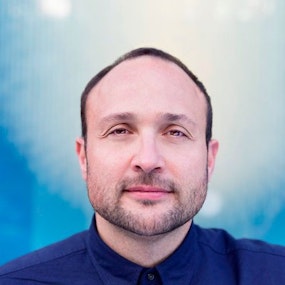
Nick Jankel
Futurist, Founder, Switch On Now & Author
Nick Jankel is a thought leader whose ideas, tools and research are designed to take the pain out of transformation, blast through the barriers that block creativity and innovation and unleash conscious changes in leadership and life that bring less suffering and more thriving into the spaces we touch. He is the co-founder of trailblazing leadership and personal development company Switch On and the chief architect of a rigorous methodology and philosophy for transformation, The Switch On Way. It blends the latest neuroscience with timeless wisdom from the great traditions. He has used the Switch On Way to lead organizations as diverse as Novartis, Nike and No.10 Downing Street to change and in his role as a coach and presenter on his own TV series on BBC. He has been featured in scores of publications ranging from the FT and the Guardian to the Daily Mail and the Sunday Times Style Magazine and has taught at Oxford, London Business School and Yale. He obtained a Triple 1st Class degree in Medicine & History and Philosophy of Science from Cambridge University, falling in love with ideas and knowledge that have influenced all his subsequent work. He is the author of the international bestseller Switch On: The New Science & Spirit of Breakthrough and forthcoming title, The Spiritual Atheist.
New to Futurized podcast?
Here are some great episodes to start with. Or, check out episodes by topic.



































